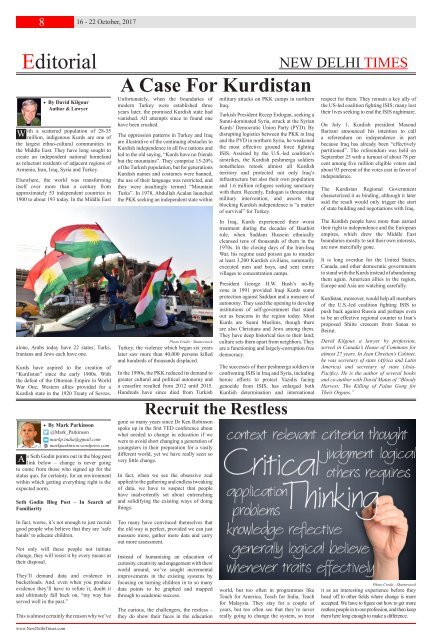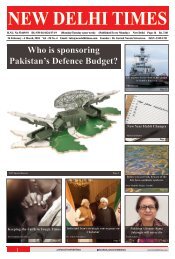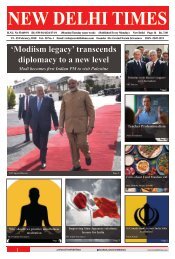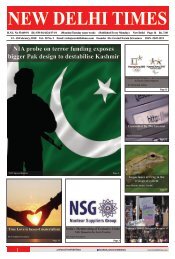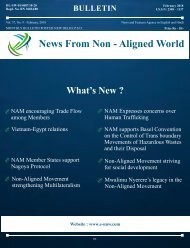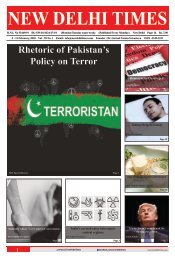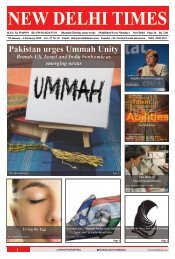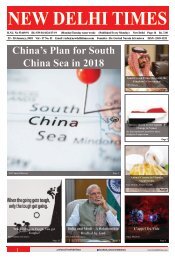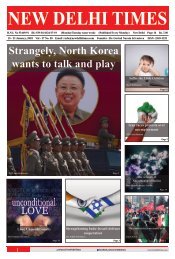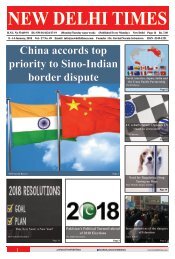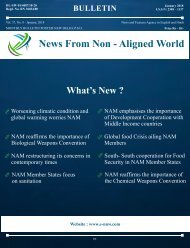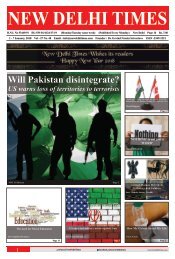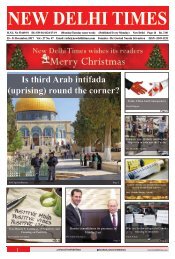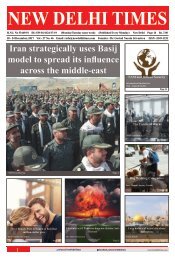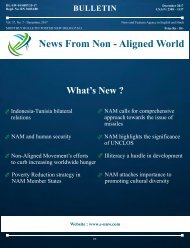Create successful ePaper yourself
Turn your PDF publications into a flip-book with our unique Google optimized e-Paper software.
8<br />
<strong>16</strong> - <strong>22</strong> <strong>October</strong>, <strong>2017</strong><br />
W<br />
A<br />
Editorial<br />
◆◆<br />
By David Kilgour<br />
Author & Lawyer<br />
ith a scattered population of 28-35<br />
million, indigenous Kurds are one of<br />
the largest ethno-cultural communities in<br />
the Middle East. They have long sought to<br />
create an independent national homeland<br />
as reluctant residents of adjacent regions of<br />
Armenia, Iran, Iraq, Syria and Turkey.<br />
Elsewhere, the world was transfor<strong>min</strong>g<br />
itself over more than a century from<br />
approximately 53 independent countries in<br />
1900 to about 193 today. In the Middle East<br />
alone, Arabs today have <strong>22</strong> states; Turks,<br />
Iranians and Jews each have one.<br />
Kurds have aspired to the creation of<br />
“Kurdistan” since the early 1900s. With<br />
the defeat of the Ottoman Empire in World<br />
War One, Western allies provided for a<br />
Kurdish state in the 1920 Treaty of Sevres.<br />
◆◆<br />
By Mark Parkinson<br />
@Mark_Parkinson<br />
markp.india@gmail.com<br />
markparkinson.wordpress.com<br />
s Seth Godin points out in the blog post<br />
link below – change is never going<br />
to come from those who signed up for the<br />
status quo, for certainty, for an environment<br />
within which getting everything right is the<br />
expected norm.<br />
Seth Godin Blog Post – In Search of<br />
Familiarity<br />
A Case For Kurdistan<br />
Unfortunately, when the boundaries of<br />
modern Turkey were established three<br />
years later, the promised Kurdish state had<br />
vanished. All attempts since to found one<br />
have been crushed.<br />
The oppression patterns in Turkey and Iraq<br />
are illustrative of the continuing obstacles to<br />
Kurdish independence in all five nations and<br />
led to the old saying, “Kurds have no friends<br />
but the mountains”. They comprise 15-20%<br />
of the Turkish population, but for generations<br />
Kurdish names and costumes were banned,<br />
the use of their language was restricted, and<br />
they were insultingly termed “Mountain<br />
Turks”. In 1978, Abdullah Acalan launched<br />
the PKK seeking an independent state within<br />
Photo Credit : Shutterstock<br />
Turkey; the violence which began six years<br />
later saw more than 40,000 persons killed<br />
and hundreds of thousands displaced.<br />
In the 1990s, the PKK reduced its demand to<br />
greater cultural and political autonomy and<br />
a ceasefire resulted from 2012 until 2015.<br />
Hundreds have since died from Turkish<br />
military attacks on PKK camps in northern<br />
Iraq.<br />
Turkish President Recep Erdogan, seeking a<br />
Sunni-do<strong>min</strong>ated Syria, struck at the Syrian<br />
Kurds’ Democratic Union Party (PYD). By<br />
disrupting logistics between the PKK in Iraq<br />
and the PYD in northern Syria, he weakened<br />
the most effective ground force fighting<br />
ISIS. Assisted by the U.S.-led coalition’s<br />
airstrikes, the Kurdish peshmerga soldiers<br />
nonetheless retook almost all Kurdish<br />
territory and protected not only Iraq’s<br />
infrastructure but also their own population<br />
and 1.6 million refugees seeking sanctuary<br />
with them. Recently, Erdogan is threatening<br />
military intervention, and asserts that<br />
blocking Kurdish independence is “a matter<br />
of survival” for Turkey.<br />
In Iraq, Kurds experienced their worst<br />
treatment during the decades of Baathist<br />
rule, when Saddam Hussein ethnically<br />
cleansed tens of thousands of them in the<br />
1970s. In the closing days of the Iran-Iraq<br />
War, his regime used poison gas to murder<br />
at least 3,200 Kurdish civilians, summarily<br />
executed men and boys, and sent entire<br />
villages to concentration camps.<br />
President George H.W. Bush’s no-fly<br />
zone in 1991 provided Iraqi Kurds some<br />
protection against Saddam and a measure of<br />
autonomy. They used the opening to develop<br />
institutions of self-government that stand<br />
out as beacons in the region today. Most<br />
Kurds are Sunni Muslims, though there<br />
are also Christians and Jews among them.<br />
They have deep historical ties to their land;<br />
culture sets them apart from neighbors. They<br />
are a functioning and largely-corruption free<br />
democracy.<br />
The successes of their peshmerga soldiers in<br />
confronting ISIS in Iraq and Syria, including<br />
heroic efforts to protect Yazidis facing<br />
genocide from ISIS, has enlarged both<br />
Kurdish deter<strong>min</strong>ation and international<br />
Recruit the Restless<br />
gone so many years since Dr Ken Robinson<br />
spoke up in the first TED conference about<br />
what needed to change in education if we<br />
were to avoid short changing a generation of<br />
youngsters in their preparation for a vastly<br />
different world, yet we have really seen so<br />
very little change.<br />
In fact, when we see the obsessive zeal<br />
applied to the gathering and endless tweaking<br />
of data, we have to suspect that people<br />
have inadvertently set about entrenching<br />
and solidifying the existing ways of doing<br />
things.<br />
NEW DELHI TIMES<br />
respect for them. They remain a key ally of<br />
the US-led coalition fighting ISIS; many lost<br />
their lives seeking to end the ISIS nightmare.<br />
On July 1, Kurdish president Masoud<br />
Barzani announced his intention to call<br />
a referendum on independence in part<br />
because Iraq has already been “effectively<br />
partitioned”. The referendum was held on<br />
September 25 with a turnout of about 78 per<br />
cent among five million eligible voters and<br />
about 93 percent of the votes cast in favor of<br />
independence.<br />
The Kurdistan Regional Government<br />
characterized it as binding, although it later<br />
said the result would only trigger the start<br />
of state building and negotiations with Iraq.<br />
The Kurdish people have more than earned<br />
their right to independence and the European<br />
empires, which drew the Middle East<br />
boundaries mostly to suit their own interests,<br />
are now mercifully gone.<br />
It is long overdue for the United States,<br />
Canada, and other democratic governments<br />
to stand with the Kurds instead of abandoning<br />
them again. American allies in the region,<br />
Europe and Asia are watching carefully.<br />
Kurdistan, moreover, would help all members<br />
of the U.S.-led coalition fighting ISIS to<br />
push back against Russia and perhaps even<br />
to be an effective regional counter to Iran’s<br />
proposed Shiite crescent from Sanaa to<br />
Beirut.<br />
David Kilgour, a lawyer by profession,<br />
served in Canada’s House of Commons for<br />
almost 27 years. In Jean Chretien’s Cabinet,<br />
he was secretary of state (Africa and Latin<br />
America) and secretary of state (Asia-<br />
Pacific). He is the author of several books<br />
and co-author with David Matas of “Bloody<br />
Harvest: The Killing of Falun Gong for<br />
Their Organs.”<br />
In fact, worse, it’s not enough to just recruit<br />
good people who believe that they are ‘safe<br />
hands’ to educate children.<br />
Not only will these people not initiate<br />
change, they will resist it by every means at<br />
their disposal.<br />
They’ll demand data and evidence in<br />
bucketloads. And, even when you produce<br />
evidence they’ll have to refute it, doubt it<br />
and ultimately fall back on, “my way has<br />
served well in the past.”<br />
This is almost certainly the reason why we’ve<br />
Too many have convinced themselves that<br />
the old way is perfect, provided we can just<br />
measure more, gather more data and carry<br />
out more assessment.<br />
Instead of humanising an education of<br />
curiosity, creativity and engagement with thew<br />
world around, we’ve sought incremental<br />
improvements in the existing systems by<br />
focusing on turning children in to so many<br />
data points to be graphed and mapped<br />
through to academic success.<br />
The curious, the challengers, the restless –<br />
they do show their faces in the education<br />
world, but too often in programmes like<br />
Teach for America, Teach for India, Teach<br />
for Malaysia. They stay for a couple of<br />
years, but too often see that they’re never<br />
really going to change the system, so treat<br />
Photo Credit : Shutterstock<br />
it as an interesting experience before they<br />
head off to other fields where change is more<br />
accepted. We have to figure out how to get more<br />
restless people in to our profession, and then keep<br />
them here long enough to make a difference.<br />
www.NewDelhiTimes.com


